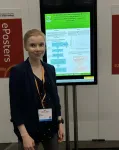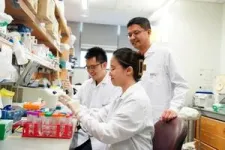(Press-News.org) Severe autoimmune conditions such Type I diabetes, Addison’s disease, lupus and inflammatory bowel disease, are between two to three times more common in women who have been diagnosed with premature ovarian insufficiency (POI) compared to the general population.
The research, published today (Thursday) in Human Reproduction, one of the world’s leading reproductive medicine journals, is the largest to investigate the link between autoimmune conditions and POI, has followed nearly 20,000 women for longer than any other study and is the only one to match women with POI with women of similar ages in the general population for comparison.
The researchers say their findings significantly strengthen the hypothesis that autoimmune processes play a “pivotal role” in the onset of POI.
POI occurs when ovaries no longer work properly and have stopped producing eggs in women younger than 40 years. Periods become irregular and then stop, and some women experience menopause symptoms.
Dr Susanna Savukoski, a gynaecology and obstetrics doctor at Oulu University Hospital and University of Oulu, Finland, led the study. She said: “Estimates of the prevalence of premature ovarian insufficiency of autoimmune origin have ranged from 4% to 50%. Our study has found that autoimmune diseases were two-to-three-fold more common in women diagnosed with POI at the time they were diagnosed, and incidence of these diseases was two-to-three-fold higher during the first years after being diagnosed with POI, compared to a control group of similarly aged women from the general population. The incidence was higher than in the control group even more than a decade after being diagnosed with POI.”
Dr Savukoski and her colleagues analysed health data from Finland’s comprehensive registries. From the medicine reimbursement registry maintained by the Social Insurance Institution of Finland, they identified 3972 women who had been granted the right to full reimbursement for hormone replacement therapy (HRT) because of POI diagnosis under the age of 40 years, between the years 1988 and 2017. Each woman with POI was matched with four women of similar ages, forming a control group of 15708 women. In both groups of women, they analysed data on severe autoimmune conditions – diseases that were diagnosed and treated in specialist health centres – between 1970 and 2017.
They found that among women who were diagnosed with POI, 223 women (5.6%) had been diagnosed with at least one autoimmune disorder before the date when reimbursement for HRT because of POI was granted, and 503 women (12.7%) were diagnosed with at least one autoimmune disorder after the date of HRT during the follow-up period.
Women were 2.6 times more likely to have an autoimmune disorder before a POI diagnosis when compared to the control group. Among women with POI, the risk of autoimmune conditions ranged from nearly double for over-active thyroid glands, to nearly 26 times for polyglandular autoimmune diseases – rare diseases of the hormone (or endocrine) system.
Women without existing autoimmune diseases at the time they were diagnosed with POI were nearly three times as likely to be diagnosed with an autoimmune disease in the following three years, with the risk decreasing but still significantly higher than in the control group during the follow-up period of at least 12 years.
Dr Savukoski said: “These findings reflect the fact that the association between POI and severe autoimmune diseases is strong and that the women with POI have long-term risk for autoimmune conditions. As with POI, severe autoimmune diseases typically manifest with significant symptoms and can have very unfavourable effects on general health, functional ability and quality of life. Luckily, there are good medication options available for many of these conditions.
“It’s important to stress that most women with POI do not develop severe autoimmune conditions and most women with severe autoimmune diseases do not develop POI. However, medical professionals should be aware of the increased risk, and patients should be informed about it as well.
“It should be noted that the risk is not the same for all autoimmune conditions: the association between POI and some autoimmune conditions, such as polyglandular autoimmune syndrome, Addison’s disease and vasculitis was very strong – a ten to 26-fold risk of having these diseases among women with POI preceding their POI diagnosis compared to the controls – while the risk of having rheumatoid arthritis or hyperthyroidism was about two-fold.
“As POI threatens fertility at a young age, this indicates that women with an increased risk of the condition should be encouraged to try to conceive when they are young. However, some autoimmune diseases can significantly increase the risk of pregnancy complications, especially if therapeutic control is not good enough, and this should be considered in discussions with patients. Unfortunately, so far, there are no treatments available to prevent the development of POI or autoimmune diseases.”
The biological mechanisms underlying the association between POI and autoimmune diseases are not fully understood, especially as the mechanisms may be different depending on the disease.
“In the future, the research should focus on finding detailed mechanisms of how POI develops in different autoimmune conditions. That would enhance development of preventive treatments against POI of autoimmune origin and other autoimmune conditions as well,” said Dr Savukoski. “We are investigating whether long-term use of HRT can prevent other conditions developing among women with POI.”
Strengths of the study include the large numbers of women and the high quality of data from the Finnish registries. A limitation is that the study only included autoimmune disorders diagnosed in specialist health centres; less severe conditions such as coeliac disease and underactive thyroid glands are often diagnosed and treated in primary healthcare, so the overall prevalence of autoimmune disorders in women with POI is higher.
END
Women with premature ovarian insufficiency are at greater risk of severe autoimmune diseases
2024-09-26
ELSE PRESS RELEASES FROM THIS DATE:
Remote video consultations linked to reduced depression and anxiety
2024-09-25
Remote video consultations between patients and mental health specialists show a small but significant improvement on symptoms of depression and anxiety, finds a trial published by The BMJ today.
Although the effect size is small, the researchers say the effect is still meaningful given the high levels of these disorders in the community.
Globally, depression and anxiety disorders are among the top leading causes of years lived with disability, but most people with depression and anxiety ...
Questions over safety and effectiveness of new Alzheimer’s drug
2024-09-25
The safety and effectiveness of donanemab - an Alzheimer’s drug recently approved by the US Food & Drug Administration (FDA) - is called into question in an investigation published by The BMJ today.
Journalists Jeanne Lenzer and Shannon Brownlee explore concerns not only about its effectiveness and the number of deaths among patients taking the drug, but also about financial ties to drug makers among the “independent” advisory panellists who recommended approval.
Donanemab, developed by Eli Lilly, is the latest in a new class ...
Additional GP funding has been squeezed this year, finds BMJ investigation
2024-09-25
Budgetary decisions by commissioners across England are affecting GPs’ ability to offer their patients what most people regard as essential services and forcing some practices to close, an investigation by The BMJ has found.
This year, eight in 10 Integrated Care Boards (ICBs) - responsible for planning health services for their local population - either reduced or froze discretionary funding for general practices as a proportion of their overall budget for services such as taking blood, wound care, ...
AI could predict breast cancer risk via ‘zombie cells’
2024-09-25
Women worldwide could see better treatment with new AI technology which enables better detection of damaged cells and more precisely predict the risk of getting breast cancer, shows new research from the University of Copenhagen.
Breast cancer is one of the most common types of cancer. In 2022, the disease caused 670,000 deaths worldwide. Now, a new study from the University of Copenhagen shows that AI can help women with improved treatment by scanning for irregular-looking cells to give better risk assessment.
The study, published in The Lancet Digital Health, found that the AI technology was far better at predicting risk of cancer ...
Breakthrough research identifies new targets for wound healing
2024-09-25
(Thursday, 26 September 2024) Novel research, presented today at the European Academy of Dermatology and Venereology (EADV) Congress 2024, has identified key molecular targets that could significantly enhance the healing of both acute and chronic wounds.1
These findings represent a crucial advancement in wound care, paving the way for more effective treatment options and improved patient outcomes.
Globally, acute and chronic wounds affect nearly one billion people.2 In particular, chronic wounds pose a substantial economic burden on healthcare systems and severely impact ...
Are branch faults the “on-ramps” that lead to great continental transform earthquakes?
2024-09-25
The five largest continental transform earthquakes since 2000 all originated on a branch of the main fault—and two researchers predict that the next great earthquake of this type will also get its start on a branch or splay fault.
Last year’s magnitude 7.8 Pazarcık earthquake in Türkiye was one of these large and damaging earthquakes, where two continental tectonic plates slide past each other horizontally. That earthquake began on a branch fault, as did the 2001 magnitude 7.8 Kokoxili earthquake in northern Tibet, the 2002 magnitude 7.9 Denali earthquake in Alaska, the 2008 magnitude 7.9 Wenchuan earthquake in China, and the 2016 ...
Tumour-specific antibodies able to detect melanoma in its earliest stages, new study shows
2024-09-25
(Thursday, 26 September 2024, Amsterdam, Netherlands) Innovative research has unveiled promising advancements in melanoma detection, which could significantly enhance diagnosis and prognosis by identifying the disease at its earliest, most treatable stages.1
This new method, presented today at the European Academy of Dermatology and Venereology (EADV) Congress 2024, uses tumour-specific profiling to detect antibodies unique to stage I and II melanoma patients.
Melanoma, a skin cancer with a high mutation rate,2 ...
When a child hurts, validating their pain may be the best first aid
2024-09-25
Whether it’s a sore arm or a fear of injections, how a child is treated when they present with pain could significantly affect how they respond to and manage pain later in life.
In a new study from the University of South Australia, researchers say that parents and doctors should be mindful of how they talk to and treat children experiencing pain – no matter how big or small the injury – knowing that these foundational experiences can be carried forward into adulthood.
Drawing from diverse research across developmental psychology, child mental health, and pain sciences, researchers say that it may be important to validate children’s pain by ...
Single-dose gene therapy is potentially life-changing for adults with hemophilia B
2024-09-25
PHILADELPHIA – Adults with hemophilia B saw their number of bleeding episodes drop by an average of 71 percent after a single infusion of gene therapy, according to the results of an international Phase III clinical trial published today in the New England Journal of Medicine by researchers from the University of Pennsylvania Perelman School of Medicine and a multicenter group of investigators.
Hemophilia is a genetic disorder that limits the blood’s ability to clot and affects around 30,000 people in the United States, ...
NEJM: Results from targeted therapy for ulcerative colitis study
2024-09-25
An international placebo-controlled study led by Cedars-Sinai suggests that a targeted drug therapy that was developed by researchers at Cedars-Sinai is safe and effective at helping people with moderate to severe ulcerative colitis reach clinical remission.
Results from the multicenter Phase II study, ARTEMIS-UC, were published in The New England Journal of Medicine.
Ulcerative colitis is a type of inflammatory bowel disease (IBD) that damages the digestive tract, causing stomach cramping, diarrhea, weight loss and rectal bleeding. ...

